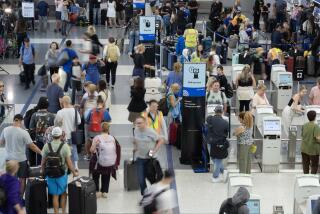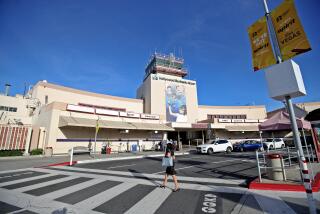Executive Travel : Motto for Stranded Air Passengers: Ask or You May Not Receive
- Share via
There are few things more disheartening than looking up at the airline monitor and seeing the words “canceled” or “delayed” next to your flight.
But if you travel often enough during the winter storm season, the likelihood is high that you’ll be stranded at an airport. The experience can be less frustrating if you have an idea of what your rights and recourses are.
Consumers who know what to ask for have a better chance of being treated to hotel rooms, complimentary rental cars or seats on other airlines, said frequent traveler and mileage expert Randy Petersen, publisher of InsideFlyer magazine in Colorado.
Petersen was recently stranded at an airport because of a mechanical problem with his aircraft. Instead of immediately requesting another flight or a meal voucher, as was his right under the circumstances, Petersen pretended to be an inexperienced, uninformed consumer.
“I got nothing,” he said. “There is a very big difference between being savvy and not knowing what to ask for.
“I didn’t ask for--nor did they offer--a food voucher,” he said. “I didn’t ask--nor did they offer--to put me up in a hotel.”
The airline didn’t offer to absorb the cost of a rental car when Petersen elected to fly into an alternate airport and then drive the rest of the way home.
Petersen has obtained all three compensations under similar circumstances in the past, but only because he asked for them.
So when are you entitled to another flight, a refund, a hotel room, a meal or a phone call?
What an airline is required to do is spelled out in its tariff under what is known as “Rule 240.”
Many carriers have a condition in their rules that states that in the presence of a “force majeure” event, which is basically any condition beyond the airline’s control, including wars, riots, embargoes, weather or other acts of God, the airline can cancel, divert or delay a flight and not be held liable for anything more than a refund. Nonrefundable tickets are refundable in such situations.
That means the airline is not required to find you a seat on another of its flights or get you a seat on a competing carrier. Of course, it doesn’t mean they won’t try to do those things.
Delta Air Lines, Alaska Airlines, Northwest Airlines, TWA and USAir all cover themselves with force majeure clauses limiting their liability.
*
If, however, you are stranded for a reason not covered under the force majeure clause, such as a mechanical failure, you have the right to be placed on another flight or, if no seats are available on the original carrier, on a flight with another airline that has space. If there are no seats to be found, the airline must give you a refund.
The same thing applies if the airline doesn’t have a force majeure clause in its Rule 240. American, America West, Continental and United, for example, do not have such language in their rules, which means they must find you an acceptable seat or refund your money regardless of the reason for the delay.
Some travelers view the opportunity for a refund as a benefit of getting stranded, especially if bad weather at their destination would have ruined their plans once they got there.
If you decide to stick it out, however, you should know that if it looks like you are going to be stuck for more than four hours and it’s after 10 p.m., most airlines will pay for a hotel room and a meal.
Alaska, for example, will provide one meal, ground transportation to a hotel (plus the room) and absorb the cost of a three-minute call to your original destination, but only if you are delayed at night.
Although airlines say they provide such services, you usually have to ask for them, Petersen said. It helps to be nice and to mention Rule 240 when seeking another flight, he said. It also helps if you happen to be a member of that airline’s frequent-flier program.
Besides being nice to the gate agent, there are a few other tricks that can help when you’re stranded.
Frequent travelers know that it’s more efficient to get another flight by using the phone rather than waiting in a long line with other frustrated passengers at the ticket counter.
Getting on the phone essentially puts you at the front of the line, Petersen said: “It’s like you’re in a virtual line.”
It’s also handy to carry a copy of the Official Airline Guide, a publication that lists all flights, to try to find your best alternative.
And sometimes the best alternative requires strategic thinking. For example, if you’re stranded because of weather, it’s sometimes better to consider “backhauling” your trip, according to Tom Parsons, editor of Best Fares Discount Travel magazine. Backhauling means flying farther from your destination to get to a hub that may offer more flights, thus increasing your chances of getting a seat. This can be particularly helpful if there would be no problem getting to your destination from a different city.
If all else fails and you end up stranded in an unfamiliar airport, even that can be an opportunity. If you are at an airport surrounded by a city, you may be able to get in a good meal or some form of entertainment.
*
It was with this in mind that author Kelly Warnken, a former employee of Eastern Airlines, published a small guidebook titled “Stranded at O’Hare” (Book Factory, P.O. Box 4430, Chicago, IL 60680-4430, $9.95 plus shipping). It lists everything from nearby restaurants (including what it costs to get there by cab or subway) to area hotels not listed in airport information booths to entertainment options, such as golf courses, health clubs and shopping malls.
When all else fails, you can always read or talk on the phone.
“I carry around all my phone numbers and end up talking to friends,” Petersen said. “It’s expensive, but it eases the pain.”
More to Read
Sign up for The Wild
We’ll help you find the best places to hike, bike and run, as well as the perfect silent spots for meditation and yoga.
You may occasionally receive promotional content from the Los Angeles Times.






